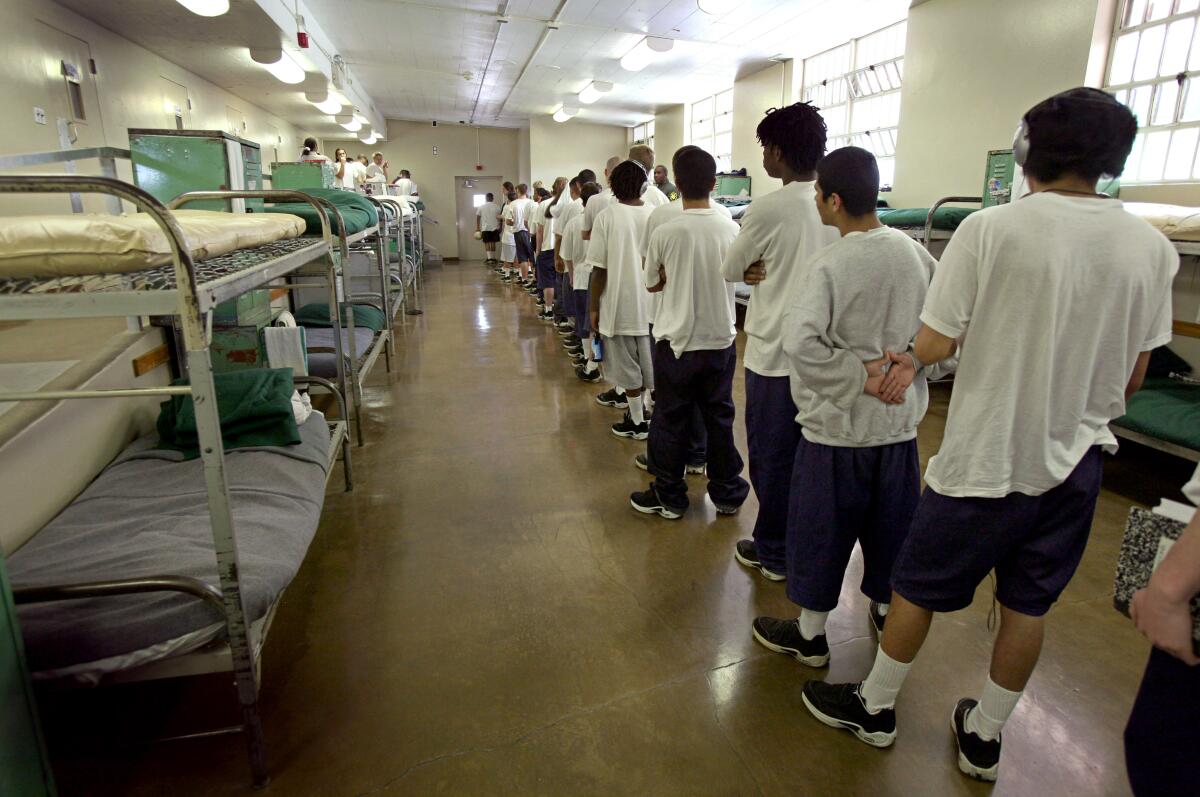Teens younger than 16 may not be tried as adults, California high court rules

- Share via
SAN FRANCISCO — A law that barred suspects under 16 years old from being tried for crimes as adults meets constitutional muster and may be enforced, the state’s highest court decided Thursday.
In a unanimous decision, the California Supreme Court upheld a 2018 state law intended to end one of California’s tough-on-crime measures that helped lead to overcrowded prisons and defied scientific consensus on brain development of juvenile offenders.
Prosecutors challenged the law, arguing the Legislature usurped its authority in amending Proposition 57, approved by voters in 2016. The measure required prosecutors to start criminal proceedings against minors in juvenile court, but allowed some cases to be transferred to adult criminal court.
Two years later, the Legislature amended the law to prohibit 14-year-olds and 15-year-olds from being tried as adults.
Justice Joshua P. Groban, writing for the court, said the new law was a valid amendment of the ballot measure.
“The amendment is fully consistent with and furthers Proposition 57’s fundamental purposes of promoting rehabilitation of youthful offenders and reducing the prison population,” Groban wrote.
The court decision was a significant victory for advocates of criminal justice reform.
Sue Burrell, policy director of Pacific Juvenile Defender Center, which co-sponsored the 2018 law, praised the court’s ruling for restoring the law to where it was years before “draconian” measures passed to crack down on crime.
“It makes no sense for us to send young people to the adult system for something they did when they were in ninth or 10th grade,” Burrell said.
A bill introduced in California this week proposes charging all teenagers as juveniles, up to age 20
New research has found that prisons and kids don’t mix. Researchers say that adolescents have lower impulse control, greater mood swings and suffer long-term damage from the kind of prolonged isolation they endure in prison.
But prosecutors argued that some juveniles who committed heinous crimes must be subject to adult trials to ensure public safety.
Ventura County prosecutors challenged the new state law in the case of a minor identified as “O.G.” Prosecutors said the 15-year-old shot and killed Jose Lopez, 22, of Port Hueneme on April 22, 2018, and stabbed to death Adrian “Mikey” Ornelas, 26, of Oxnard on May 20, 2018, “in order to gain respect from his fellow gang members.”
A court of appeal sided with the prosecutors, leading to a split in rulings over the 2018 law that required the California Supreme Court to intervene. Other courts of appeal had upheld the law.
“As the result of this ruling, all 14- and 15-year-old murderers — no matter how many people they kill or the circumstances of the murders — can only be incarcerated up to age 25,” said the Criminal Justice Legal Foundation , a pro-death-penalty group, after Thursday’s decision.
Kymberlee Stapleton, an attorney with the group, said the ruling meant “the state will now be required to mandate that they release some of the most violent juvenile criminals in the country.” She added that it “opened the door to appeals from other juvenile murderers and sex offenders who received adult sentences, claiming that they are entitled to a new trial in juvenile court.”
The law generally requires that offenders found culpable in juvenile court must be released at the age of 25. But the state Supreme Court said prosecutors could still seek an extension of the confinement for offenders beyond that age.
The new law prohibits the transfer of juveniles accused of committing crimes when they were 14 or 15 to adult court unless the offenders were apprehended after becoming legal adults.
Groban noted that the juvenile justice system “provides age-appropriate treatment, services, counseling, and education, and a youth’s participation in these programs is mandatory.”
The adult system, by contrast, has no services geared for adolescents, participation in rehabilitation programs remains voluntary, and many such programs have long waiting lists, the justice noted.
Los Angeles County Dist. Atty. George Gascón praised the court decision.
“We know from science that young people have the capacity for growth and development that increases their likelihood of rehabilitation,” he said. “Research shows that rehabilitation works, and by rehabilitating our children, we will make it less likely that they will commit new crimes, thereby preventing victimization in the future and promoting healing in our communities.”
California Insurance Commissioner Ricardo Lara, who as a state senator coauthored the law in 2018, reacted to the ruling by calling all children “redeemable.”
“Today the Supreme Court upheld that principle and took another huge step toward fairness in our juvenile justice system,” Lara said.
More to Read
Sign up for Essential California
The most important California stories and recommendations in your inbox every morning.
You may occasionally receive promotional content from the Los Angeles Times.











